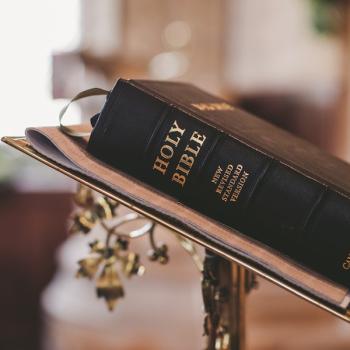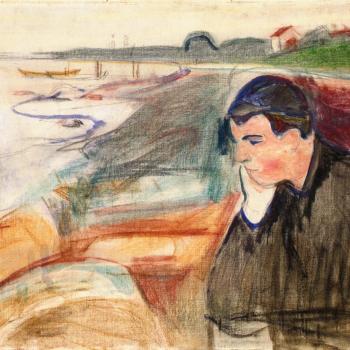
Twitter and Facebook have made it more than clear that Latin Advent has begun. Devotionals are being posted, prayers recommended, and all sorts of exhortations are circulating through the digital world. It occurred to me that many people (you treasured few who waste bits of your time reading my work!) might not know much about the Byzantine version of this liturgical period, a preparatory time second only to the Great Fast (before Pascha, also known as Easter) for those of us who draw faith from this particular Eastern tradition.
For starters, we don’t call it Advent (hence the scare quotes in the title). Advent is, after all, a Latinate word [ad (to, toward) + venire (to come) → advenire (to come to, to arrive) → adventus (approach, arrival)]. In English, the word arrived from the French “auvent,” as is so often the case with our Latin holdovers. But here, for us Byzantines, the story gets interesting. “Advent” (as with many liturgical terms) is a translation of the Greek “Parousia”:
The Latin “Advent” is the Latin translation of the Greek word, “Parousia” that does not mean “expectation” of the end of the world, or even simply “expectation,” but “arrival” or “the beginning of a presence.” Etymologically, it means the “arrival” of the King who bestows his parousia, on his devotees for a time. However, he is not yet present in all His glory. (Fr. Joseph Ratzinger)
The Byzantine version is thus very consciously a meditation on the Incarnation. It is true that the end of all things is always on the mind of he who reflects on the coming-to-be-man of the Second Person of the Trinity, but that is not the primary focus. We reflect upon the miraculous birth of God into the material world, upon the arrival of the truth that sets us free:
Everyone who believes that Jesus is the Christ is begotten by God, and everyone who loves the father loves [also] the one begotten by him. In this way we know that we love the children of God when we love God and obey his commandments. For the love of God is this, that we keep his commandments. And his commandments are not burdensome, for whoever is begotten by God conquers the world. And the victory that conquers the world is our faith. Who [indeed] is the victor over the world but the one who believes that Jesus is the Son of God? This is the one who came through water and blood, Jesus Christ, not by water alone, but by water and blood. The Spirit is the one that testifies, and the Spirit is truth. (1 John 5:1-6)
With all of this in mind, the Christmas season brings an end to our waiting and a movement from joyous expectation to revel in the arrival of the Lord. Hence, those of us in the Slavic Byzantine tradition proclaim: Christos Razdajestsja (Christ is born!) and respond with Slavite Jeho (Glorify him!).
This difference of emphasis (perhaps compared to the Latin regard for Christ’s Second Coming—this is clear in the Gospel readings for the period) is also reflected in certain differences of practice. There are no special candles or (to my knowledge) chocolate calendars. Rather, there is a fast, a 40 day fast, beginning the day after the Byzantine Feast of St. Philip (hence it is often called “St. Philip’s Fast”). The requirements are those of most Byzantine-rite abstinences:
According to some sermons of St. Gregory of Nazianzus, he introduced this feast into the Eastern Church about the year 379 or 388. After his departure from Constantinople the celebration of Christ’s Nativity on December 25 was neglected. In 395 Emperor Honorius reinstituted the celebration. St. John Chrysostom tells us how he introduced this feast at Antioch sometime around 380. He explicitly says how he introduced it in imitation of the Church at Rome. St. John believed that the Roman Christians knew the date of Christ’s birth better than anybody else since the imperial city archives were accessible to them.
The first mention of a preparatory period before Christmas is mentioned in a decree of the Council of Saragossa (380). The Council Fathers stated that every Christian should daily go to church from December 17 until the Theophany (January 6th). At the Synod of Mac (581) in present day France it was decreed that from November 11, the day of St. Martin, until December 24 every Christian should fast 3 times a week (Monday, Wednesday, Friday).













